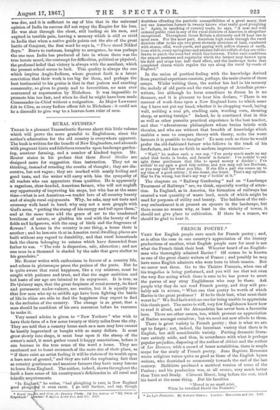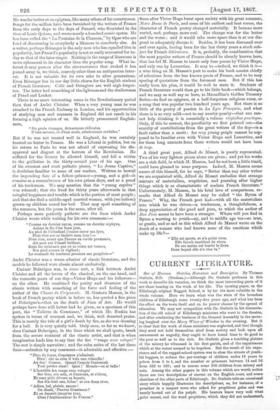FRENCH POETRY.*
VERY few English people care much for French poetry ; and, as is often the case in one country's appreciation of the literary productions of another, what English people care for most is not what the French think their beat. Whoever heard of an English- man who thoroughly admired Racine ?. Of course he is known as one of the great classic writers of France ; and possibly he may have some English admirers who were born to blush unseen. But we never met them. Go to the Theatre Francais, when one of his tragedies is being performed, and you will see that not even the very fine acting which there is sure to be has power to avert the yawns of any stray Englishman who may be there. Ask people why they do not read French poetry, and they will pro- bably ask in return, "What can that poetry be worth of which Racine is the great professor ? If he be their best, what must their worst be !" We find fault with no one for being unable to appreciate this classic poet. The metre is stiff, very few Englishmen know how to read it aloud, and the Alexandrine has never been a favourite here. There are other causes, too, which prevent an appreciation of Racine amongst ourselves ; but we need not now allude to them.
There is great variety in French poetry ; that is what we are apt to forget ; not, indeed, the luxuriant variety that there is in English, but still considerable variety. Putting dramatic litera- ture entirely aside, and thus, in accordance with what is perhaps popular prejudice, disposing of the author of Athlaie and the author of Les Horaces, with a crowd of lesser notabilities, there is ample scope for the study of French poetry. Jean Baptiste Rousseau wrote religious verses quite as good as those of the English hymn writers, who flourished so numerously towards the end of the last century. Malfilatre produced a metrical version of some of the Psalms ; and his production was, at all events, very much better than Tate and Brady. Clement Marot, long before the rest, tried his hand at the same thing. But his faculties
"Moved in no small mist, When he versified David the Psalmist."
• La Lyre Fran cam. By Oucave itasto3. London Macmillan and Co. 1587.
He was far better at an epigram, like many others of his countrymen. Songs for the million have been furnished by the writers of France
from the early days to the days of Panard, who flourished in the time of Louis Quenze, and wrote nearly a hundred comic operas. He
has been called the "La Fontaine de la Chanson," by tlpae who are fond of discovering in everybody a likeness to somebody else. As a writer, perhaps Beranger is the only man who has equalled him in popularity, but Panard's popularity is not so easily accounted for to- day as that of the later singer. Nothing in the range of literature is more ephemeral in its character than the popular song. What in- terest it may possess after the circumstances that evoked it has passed away is, we think, scarcely other than an antiquarian inter- est. It is not valuable for its own sake to after generations.
Even Beranger has in our day little charm for the English student of French literature. Colle and Desagiers are well nigh forgot- ten. The latter bad something of the lightness and the shallowness of Praed and Locker.
There is no more interesting name in the Revolutionary period than that of Andre Chenier. When a very young man he was attached to the French Embassy in London, and his opportunities of studying men and manners in England did not result in his forming a high opinion of us. He bitterly pronounced English- men, "Da genie &ranger, &Amateurs ridicules, D'ens-memes, ot d'eux seals, admirateurs credules."
But if he was not treated well in England, he was certainly treated no better in France. He was a Liberal in politics, but on his return to Paris he was not afraid of expressing his dis- approval and disgust at the horrors of the Revolution. He suffered for the licence he allowed himself, and fell a victim to the guillotine in the thirty-second year of his age. One of his sweetest and most pathetic pieces, " Ls Jenne Captive," is doubtless familiar to some of our readers. Written to bewail the impending fate of a fellow-prisoner—young, and a girl—it remains as a remembrance of his own prison days, and as a proof of his tenderness. We may mention that the "young captive" was released ; that she lived for thirty years afterwards in that mingled happiness and trouble which is the portion of most people ; and that she died a middle-aged married woman, with (we believe) grown-up children round her bed. That may spoil something of the romance, but the poem is the same, after all.
Perhaps more perfectly pathetic are the lines which Andre Chenier wrote while waiting for his own summons :—
" Demme un dernier rayon, comma un dernier zephyr°,
Anime la fin d'un beau jour, Au pied de feohafaud j'essaie encor ma lyre, Pent-etre eat-ce bientot mon tour Pent-dire, avant que l'heure en cercle promenes, Ait pose sur l'email brillant, Dana lea soixtante pas oft sa route eat borne°, Son pied sonore et vigilant; Le sommeil du tombean pressers ma panpiere—" Andre Chenier was a warm admirer of classic literature, and the models he followed were classic almost exclusively.
Casimir Delavigne was, in some sort, a link between Andre Chenier and all the lovers of the classical, on the one hand, and the romantic poets of our day—Victor Hugo and his followers— on the other. He combined the purity and clearness of the classic writers with something of the force and feeling of the author of the Chants du Cre'puscule. M. Gustave Masson, in the
book of French poetry which is before us, has quoted a fine piece of Delavigne's—that on the death of Joan of Arc. He would perhaps have done still better had he given, as a specimen of this poet, the "Toilette de Constance," of which Mr. Ruskiu has
spoken in terms of warmest and, we think, well deserved praise. This is merely the tale. of a girl's death by fire, as she was dressing for a ball. It is very quietly told. Only once, so far as we know, does Casimir Delavigne, in the lines which we shall quote, break from the severe restraint of the classic artist, and that is when imagination leads him to say that the fire " ronge avec voluptd." The rest is simple narrative ; and the calm satire of the last three lines—unbroken by any comment—is admirable and effective Pres du foyer, Constance s'admirait.
Dien! Bur sa robe il vole une etincelle!
Au fen! Conan. Quand l'espoir l'eniverait Tout perdre ainsi! Quoi I Monrir—et si belle !
1. L'horrible feu ronge avec volupte
Sea bras, son sein, et rentoure, et s'eleve, Et sans pitio devore sa beante, Sea dix-huit ass, helas ! et son deux rev°.
"Adieu, bal, plaisir, amour !
On disait, `Pauvre Constance!'
Et on dansait jusqu'au jour, Chez l'Ambassadeur de France'
Soon after Victor Hugo burst upon society with his great romance, Notre Dame de Paris, and some of his earliest and best verses, the character of French poetry changed materially. It became more
varied, and, perhaps, more real. 'rho change was for the better and the worse ; and it would take more space than is at our dis-
posal to adequately discuss it. Besides, it has been discussed over and over again, having been for the last thirty years a stock sub- ject for French litterateurs. It is, probably, the consideration that-
the most popular writers of France should be already known here,
that has led M. Masson to insert only four poems by Victor Hugo, and only one by Lamartine. It may be—indeed, we think it is— a wise thing on M. Masson's part to make his book consist chiefly of selections from the less known poets of France, and to be very sparing of quotations from the foremost men. But if this has really been his plan, it would be well to state it. Students of French literature would then go to his little book—which belongs, and we may as well say so here, to Macmillan's Golden Treasury Series—to find an epigram, or a half-forgotten religious verse, or a song that was popular two hundred years ago. But there is so little of the poetry of passion in La Lyre Frangaise, and what there is is so very mild—not to say namby-pamby—that one can- not help thinking it is essentially a volume virginibus puerisque. Only, if this be correct, the peculiarity we first pointed out—the scarcity of contributions from the great writers of the day—is a fault rather than a merit ; for very young people cannot be sup- posed to be familiar even with Victor Hugo and Lamartine, and for them long extracts from these writers would not have been de trop.
A third great poet, Alfred de Musset, is poorly represented. Two of his very lightest pieces alone are given ; and yet his works are a rich field, in which M. Masson, had he not been a little timid, could have gleaned to some purpose. Indeed, M. Masson seems aware of this himself, for he says, "Better than any other writer we are acquainted with, Alfred de Musset embodies that strange mixture of materialism, scepticism, and yearning after higher things which is so characteristic of modern French literature." Unfortunately, M. Masson, in his fatal love of comparisons, re- marks that Alfred de Musset may be called "the Byron of
France." Why, the French poet bad—with all the materialism into which he was driven—a tenderness, a thoughtfulness, a deep appreciation of the good and pure, to which the author of Don Juan seems to have been a stranger. Where will you find in Byron a warning to youth—ay, and to middle age too—so true,
so gentle, and so sad as this which Alfred de Musset wrote on the death of a woman who had known none of the emotions which make up life?—
" Elle eat mono, et n'a point vecu. Elle faisait semblant de vivre. De ses mains eat tomb° is livre Dana lequel elle n'a rien ht."































 Previous page
Previous page